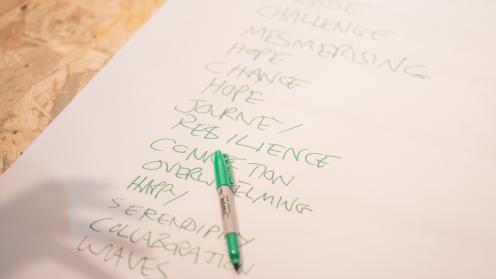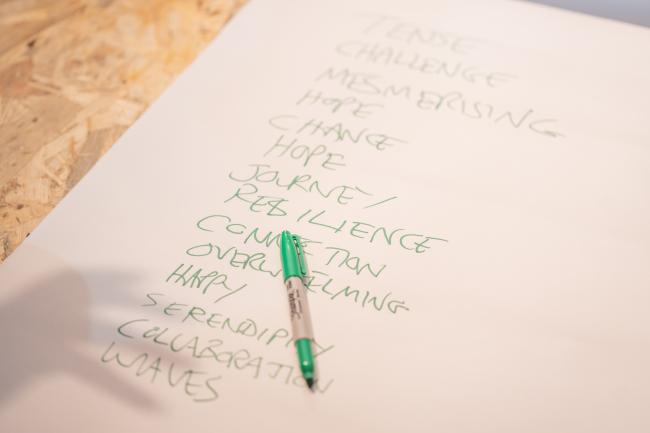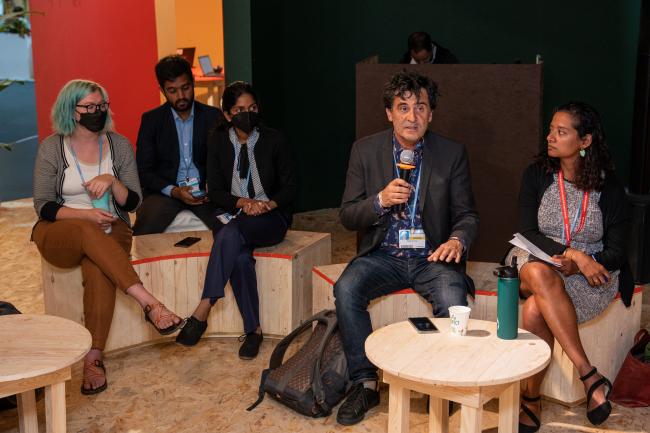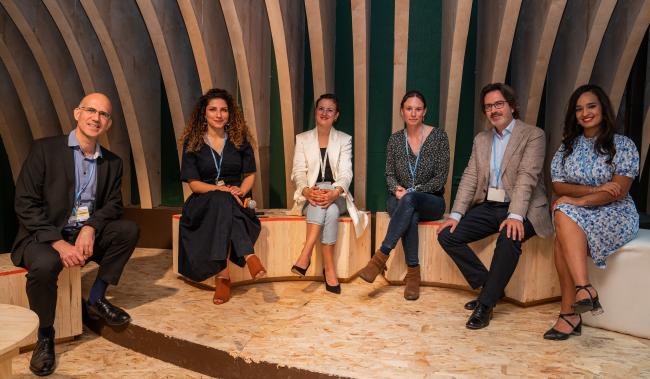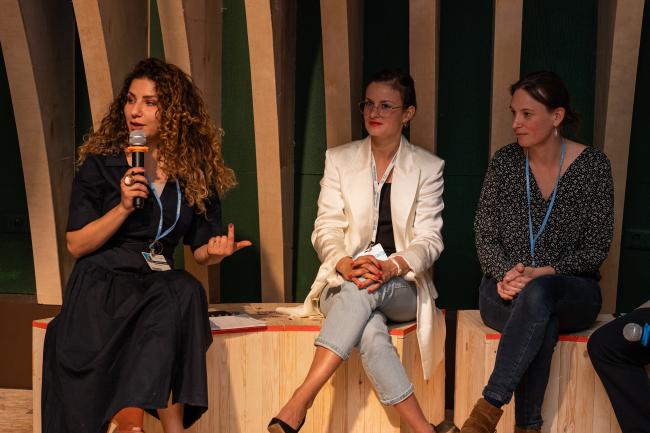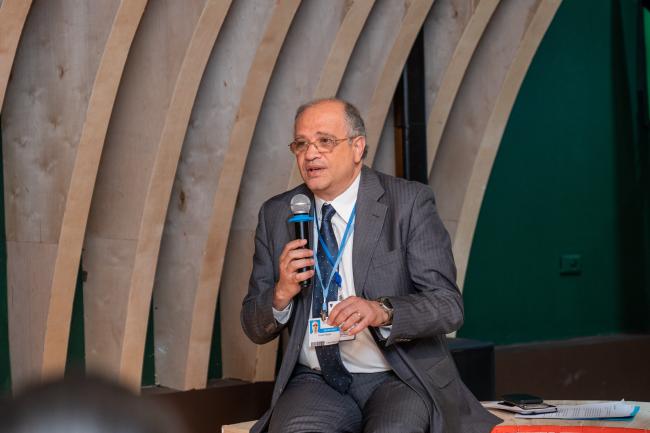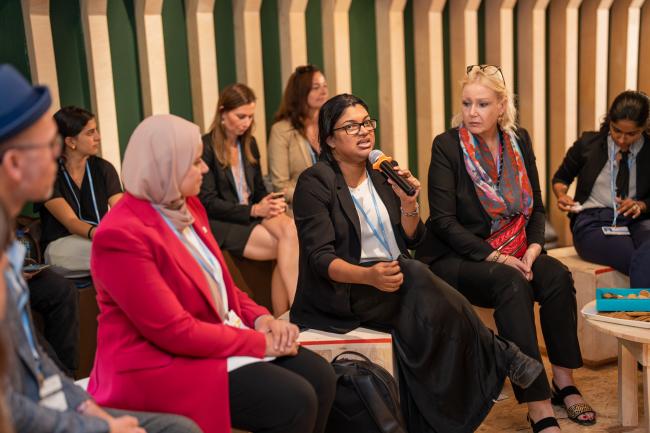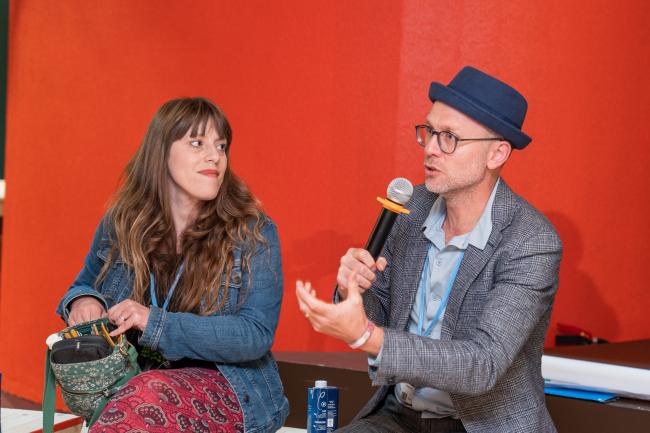Developing Transformative Financial Mechanisms
The transformation of the financial system can be an important tool towards supporting environmental and human well-being. Through the use of technologies such as those in the fintech space, we can track finance in a way that accelerates sustainable practices, while the wider financial system operates to provide fair access to citizens and businesses working for this future. This vision encapsulated the eighth and final Resilience Frontiers pathway: Developing transformative financial mechanisms.
In the first session of the day “Finance models for the future,” moderator Dennis Mombauer, SLYCAN Trust, introduced the panelists and inviting them to each share their experiences relating to the pathway.
Daniel Zimmer, Climate-KIC, provided an overview of a project in Tanzania that allows farmers to access small loans. As the farmers were supported by insurance, a guarantee mechanism was put in place to help pay back the loan, he explained.
Zimmer highlighted three key points of learning from this project:
- to transform a system, it is essential to ensure the value created can be shared in an equitable way between the different actors in the value chain;
- risks involved are not only financial, they are multi-faceted; and
- creating trust between partners is vital.
Sarada Krishnan, Crop Trust, shared details of an endowment fund. She stated the aim of raising USD 850 million to provide long-term funding to crop gene banks worldwide, noting that “for climate change adaptation, we need to tap into these gene sources.”
Nisha Krishnan, World Resources Institute, opined that patient funding was needed saying this funding “takes time, needs to be flexible, and know how to adapt to increasing changes.”
Claudia Belli, BNP Paribas, said funding climate resilience can start anywhere. She noted the launch of the Just Institute, a social business that will work with financial providers to make farming more resilient, thereby reducing the risk to investors and increasing funding.
Julie Segal, Environmental Defence, underscored that finance regulation is vital to ensure “moving money out of the problem and into the solution.” She opined that there is a need for simplification and scalability in products and that climate justice must be at the center of all decisions. She added “We need to innovate how finance works. We should be putting on new constraints and parameters to ensure the financial system is working in the best interest of the people. This exists in public policy, but not in financial policy.”
Belli noted that, in March 2022, BNP Paribas issued an alignment report looking at how to achieve net zero by measuring the most carbon-intensive sectors and looking to decrease lending in the oil, energy, and automobile sectors.
Mombauer concluded with the comment: “Let’s use finance to create a better future.” Liv Torc of the Hot Poets produced a poem encapsulating the conversation.
The second session of the day looked at transformative financing. Moderator Abir Haddad, Founder and Director, Institute for Legal Transformation, introduced the details of the eight pathways and asked speakers what makes their organization different in relation to the pathway.
Sebastien Soleille, BNP Paribas, said they seek to use money for the good of their clients, but also for society. This is done, she added, by investing in companies that help progress a sustainable future, including technology companies that can help bring further development.
Engy Abdel Wahab, UNDP Egypt Accelerator Lab, warned that solutions are often developed without analyzing needs, adding that farmers’ needs must be understood for solutions to have impact. Future thinking, experimentation, and solutions mapping is critical to the UNDP Egypt Accelerator Lab’s work, she continued.
Marc Garcia-Durán, Executive President and Founder, Underwater Gardens International, opined that we need finance systems to help make ecosystem regeneration profitable. He stated the use of a regeneration plan to create the “purest” forms of credits, adding that finance should be about people taking care of the planet.
Kat Bruce, NatureMetrics, explained her organization’s work with a tool called “environmental DNA.” This tool, he said, uses predictable signals within DNA found in water to build metrics to show whether we are getting better or worse within an ecosystem. Bruce explained this can help create measurable key performance indicators that can support lending, investments, and insurance.
Sabrina Nagel, YAPU Solutions, stated her company’s aim of building trust across the value chain, saying, “It starts with the farmers. They need to trust in the solutions.” Haddad brought the focus back to the pathway and a future-oriented perspective, asking speakers to explain how they envision the financial system in 2050.
Soleille stated that, instead of GDPs and financial returns, nature and relationships would soon be valued more. A participant from the floor opined that all nation-states will one day follow the Bhutanese model of Gross National Happiness.
Haddad raised the topic of decentralized finance, such as cryptocurrencies. Abdel Wahab responded that this topic had featured in the desired future scenarios imagined in a future thinking workshop conducted with local farming communities in Egypt. This workshop had shown these desired a future with tailored digital currencies, as opposed to paper money.
The session was creatively summed up in a poem by Chris Redmond of the Hot Poets.
The final closing session of the day consisted of a conversation with Youssef Nassef, UNFCCC Secretariat and founder of Resilience Frontiers. The session provided the opportunity to share reflections about the experiences throughout the programme and gather suggestions and ideas for the future. Comments highlighted the intimate format of the Pavilion conversations, as well as the unique connections made. One of the suggestions was to create local Resilience Frontiers hubs across the world.
The day, and the programme, closed with a creative session with the Hot Poets. Participants reflected on their time at COP 27, writing down some of the things that they would like to leave in Egypt when they go back home (like the mosquitoes) and some they would take with them (like learning and connections). The result was turned into a shared poem by Chris Redmond.
Organizers: Resilience Frontiers
UNFCCC Contact: Susan Robertson I srobertson@unfccc.int
For more information: https://resiliencefrontiers.org
To receive free coverage of global environmental events delivered to your inbox, subscribe to the ENB Update newsletter.
